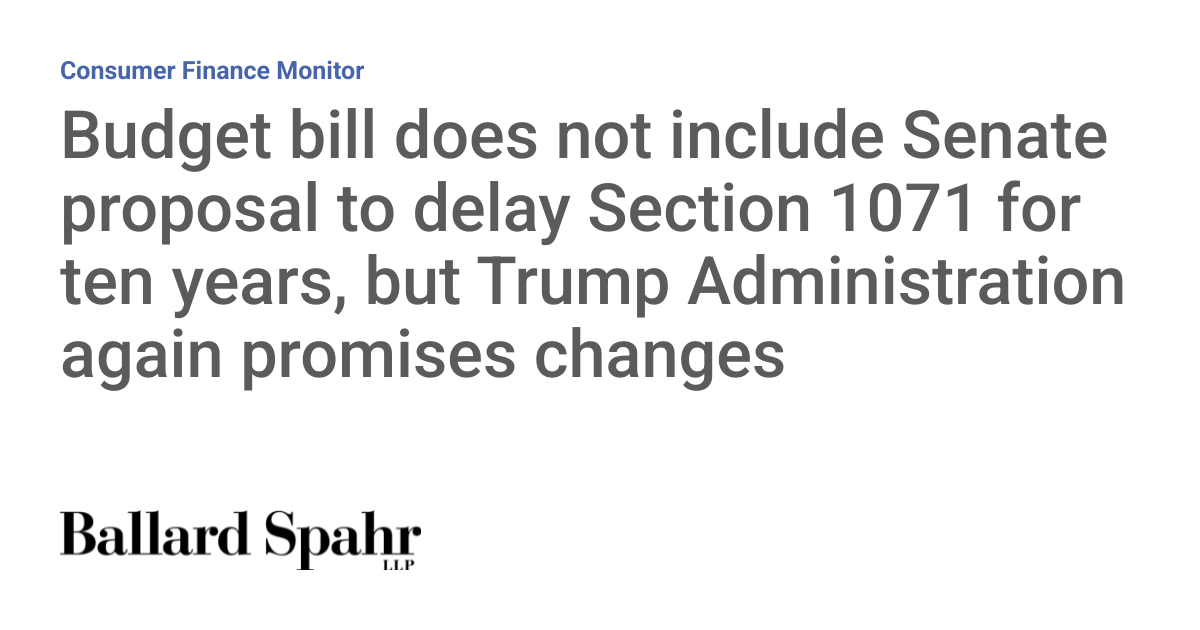
Budget bill does not include Senate proposal to delay Section 1071 for ten years, but Trump Administration again promises changes
How did your country report this? Share your view in the comments.
Diverging Reports Breakdown
Budget bill does not include Senate proposal to delay Section 1071 for ten years, but Trump Administration again promises changes
The Section 1071 rule is a Dodd-Frank provision that requires financial institutions to report information contained in loan applications. The rule has been subject to criticism from small business lenders and their representatives and members of Congress. The Trump Administration has promised changes to the rule. The earliest initial compliance date will be postponed for all regulated parties for about one year. The Revenue Based Finance Coalition filed a lawsuit against the CFPB in U.S. District Court for the Southern District of Florida challenging the 1071 Rule.. Lawsuits also have been filed in federal courts in Kentucky and Texas.
The Section 1071 rule is a Dodd-Frank provision that requires financial institutions to report information contained in loan applications submitted by small businesses, including women-owned, minority-owned and LGBTQI+-owned small businesses. The rule significantly expands the data reporting categories specified by Congress and has been subject to criticism from small business lenders and their representatives and members of Congress.
As originally proposed by the Senate Banking Committee, and approved by the Senate Parliamentarian, the budget bill would have delayed implementation of the rule for ten years. The budget bill does include massive cuts in CFPB funding, but the delay provision was not included in the final bill and there has been no discussion about why it was deleted.
However, the Trump Administration has promised changes to the rule. On June 18, the CFPB published in the Federal Register an Interim Final Rule that extended the Section 1071 compliance dates for all regulated entities. As a result, the earliest initial compliance date will be postponed for all regulated parties for about one year. The earliest compliance date for the highest-volume lenders is set for July 1, 2026.
And the administration and plaintiffs, in a lawsuit filed by the Revenue Based Finance Coalition, made it clear that changes will be made to the Section 1071 rule. The coalition, a trade group whose members include non-banks that provide sales-based financing to businesses, filed a lawsuit against the CFPB in U.S. District Court for the Southern District of Florida challenging the 1071 Rule.
In a joint status report, filed July 7 in the Florida Court, the CFPB and the coalition said that the extended deadlines should be sufficient for the “CFPB to issue a new proposal to reconsider certain aspects of the 2023 final rule.”
The lawsuit is not the only one challenging the Section 1071 rule. Lawsuits also have been filed in federal courts in Kentucky and Texas.
Last year Congress voted to disapprove the Section 1071 rule under the Congressional Review Act (CRA), but President Biden vetoed the measure, and Congress was unable to override the veto.
Separately, on April 2, 2025, the House Financial Services Committee approved H.R. 976, which would repeal Section 1071. Under rules governing the CRA, opponents of the Section 1071 rule cannot use the CRA again to try to nullify the rule. Also, unlike measures under the CRA, which are not subject to a filibuster in the Senate, legislation to repeal Section 1071 could take 60 votes in the Senate to break a filibuster.
